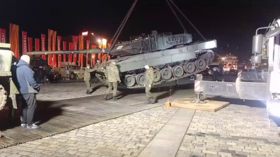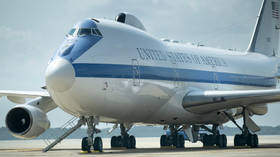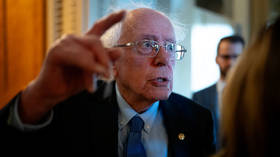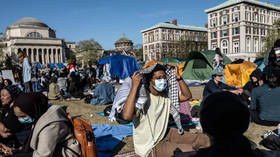“Recognition of Abkhazia and S. Ossetia prevented bloodbath” – Medvedev
During his visit to Abkhazia, Russia’s President Dmitry Medvedev met with Russian tourists and discussed the 2008 Georgian-South Ossetian war and Russia’s subsequent recognition of Abkhazia and South Ossetia with them.
Hundreds were killed and thousands displaced when Tbilisi attacked the republic with artillery and tanks two years ago.
Moscow sent forces to protect the people in the area, many of whom were Russian citizens. After five days of bloody battles, the Georgian troops were pushed back to the border.
Following the conflict in South Ossetia, Russia decided to recognize the independence of the republic, as well as the neighboring region of Abkhazia.
“The decision Russia made after the military conflict wasn’t an easy one. But time has shown it was the right move. The existence of the Abkhazian and South Ossetian people was at that time under threat. And if those decisions hadn’t been made – the situation would have been totally different. We wouldn’t be drinking coffee here. Most likely there would be a lengthy bloody conflict,” Medvedev said. “We were right in our actions, managing to both save the people and prevent a bloodbath.”
He added that he was glad to see life changing for the better in the region, and promised that Russia would continue to help with the reconstruction.
The next step is likely to be the resumption of direct air travel to Abkhazia, which was stopped after Georgia's war with the republic in the early 1990s.
West continues to arm Georgia
For his part, Abkhazian President Sergey Bagapsh thanked Russia for its support “in times of the most difficult period in our history.”“Following the recognition of Abkhazian independence, Russia has been with us. Abkhazia has been and will be Russia’s closest ally,” Bagapsh told Interfax. He said that last two years have been a time of “stability, calm and creation” as opposed to the situation before the recognition of the republic, which was neither at peace nor war.
“Today we are restructuring not only our economy but also Abkhazian people’s minds along the peaceful lines. And what is most important is that we are succeeding in it,” Bagapsh added.
At the same time, the republic’s leader warned that it cannot be ruled out that the events of August 2008 could repeat since “I can see the way Western countries keep arming Georgia.”
He reminded that they had warned the international community of Tbilisi’s military plans before the August war, but had been ignored. “Today some Western countries are in effect conniving at Georgian plans for a new aggression,” Interfax cites Bagapsh as saying. However, “thanks to Russia” the situation now is completely different and “I'm sure that the current Georgian leadership will not be able to get away with its new armed provocations,” he concluded.
Meanwhile, Eduard Kokoity, the President of South Ossetia, expressed hope that the Geneva talks will finally yield results and an agreement on the non-use of force will be signed.
“We really hope that the Geneva talks will bring positive results and a memorandum on the non-use of force, which Georgia is evading, will be signed,” he said on Sunday. The document, he said, would make the Georgian side refrain from yet another aggression. At the same time, it is doubtful the agreement would make President Mikhail Saakashvili’s regime control its rhetoric.
“We condemn those who organized and led this inhumane operation codenamed ’Clear Field’ [that Georgia launched against South Ossetia]. They have not recognized their responsibility and even today try to shift the blame on South Ossetia and the Russian Federation,” Kokoity is quoted as saying.
The South Ossetian leader expressed the same concerns as his Abkhazian counterpart saying that some countries, “NATO in particular”, did not learn any lessons from the events of August 2008 and keep arming Georgia. “This impunity is arousing revenge-seeking sentiments in Georgia, and we must do everything to prevent a repeat of this aggression,” Kokoity stated.
Earlier, Russian officials voiced their worries over the situation. Russia's Deputy Foreign Minister Grigory Karasin has urged an arms embargo on Georgia. “A number of patrons of the ‘Georgian democracy’ are still seeking to use every pretext to re-equip Georgia's military and involve them in various international operations,” he said in an interview with Itar-Tass.












